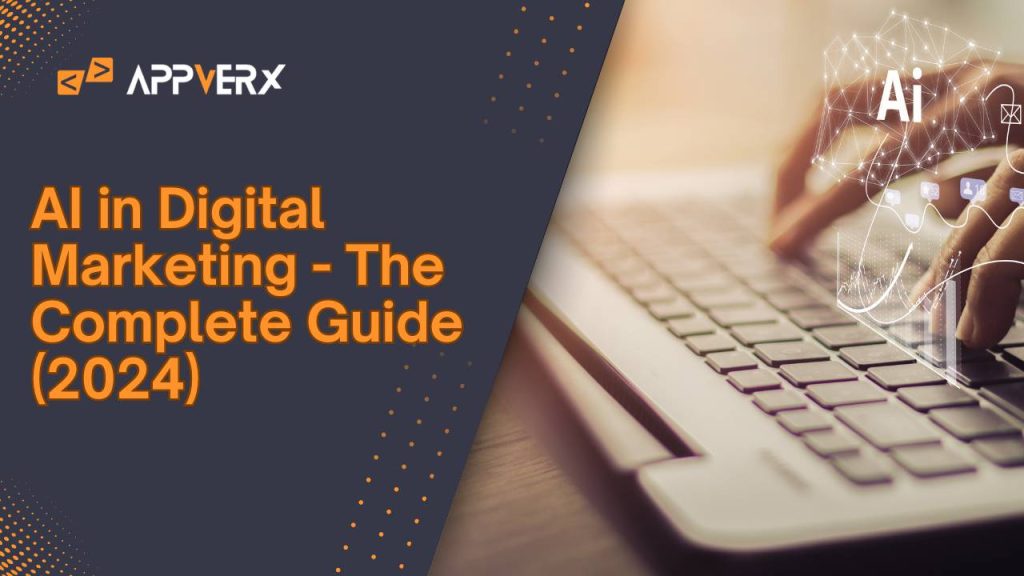In the swiftly changing terrain of the digital world, incorporating Artificial Intelligence (AI) is now crucial for businesses striving to maintain their competitive edge. AI, a branch of computer science that simulates human intelligence in machines, is revolutionizing industries worldwide, and digital marketing is no exception. This comprehensive guide aims to delve into the intricacies of AI in digital marketing, highlighting its significance and providing insights into leveraging AI for successful marketing campaigns.
Understanding AI in Digital Marketing
Core AI Technologies in Digital Marketing
Machine Learning
Machine Learning (ML) lies at the heart of AI-driven marketing strategies, empowering marketers with predictive analytics and automation capabilities. Machine Learning algorithms sift through extensive datasets to detect patterns and trends, facilitating accurate customer segmentation and tailored advertising campaigns. Machine Learning amplifies marketing productivity and impact by suggesting products based on past purchases or refining email marketing processes.
Natural Language Processing (NLP)
Natural Language Processing (NLP) allows machines to comprehend and interpret human language, paving the way for sophisticated marketing strategies. NLP-driven sentiment analysis tools scrutinize customer feedback and social media interactions, furnishing invaluable perspectives on brand perception and customer attitudes. Additionally, NLP-driven chatbots revolutionize customer service by offering instant assistance and personalized interactions.
Data Analytics
Data serves as the lifeblood of AI in digital marketing, fueling insights and strategies for informed decision-making. Sophisticated analytics software analyzes and interprets data streams from diverse channels such as social media platforms, websites, and customer interactions. Through leveraging data analytics capabilities, marketers acquire profound insights into consumer behaviour, preferences, and evolving trends, facilitating the creation of tailored and personalized marketing initiatives.
Benefits of AI in Digital Marketing
Increased Efficiency & Automation
AI enhances marketing efficiency by automating repetitive tasks, enabling marketers to dedicate their attention to strategic endeavours. Through automated workflows encompassing email marketing, social media management, and content distribution, the need for manual intervention diminishes, resulting in time and resource savings, all while ensuring the consistent and punctual execution of marketing campaigns.
Enhanced Personalization
Personalization lies at the core of successful marketing endeavours, and AI enables hyper-targeted approaches based on individual preferences and behaviour. Utilizing machine learning algorithms, marketers possess the capability to provide customized content, suggest products, and present offers personalized to individual customers, thus amplifying interaction levels and stimulating conversion rates.
Improved Campaign Performance
AI-driven optimization techniques elevate campaign performance by continuously analyzing data and refining strategies for maximum impact. A/B testing frameworks powered by machine learning algorithms enable marketers to experiment with different variables and iterations, optimizing ad creatives, messaging, and targeting parameters to maximize ROI and achieve marketing objectives.
Deeper Customer Insights
AI unlocks valuable insights hidden within vast datasets, enabling marketers to gain actionable intelligence into consumer behaviour and market dynamics. By leveraging advanced analytics and predictive modelling, marketers can anticipate customer needs, identify emerging trends, and adapt real-time marketing strategies, fostering long-term customer relationships and brand loyalty.
Practical Applications of AI in Digital Marketing
Content Creation & Management
Content Brainstorming & Ideation
AI-driven solutions enable the process of content brainstorming by examining current trends, popular keywords, and audience inclinations, thereby generating innovative concepts and frameworks. Content strategists can utilize AI-generated insights, crafting captivating and pertinent content that deeply connects with their desired demographic, fostering interaction and enhancing brand presence.
AI-powered Writing Tools
From blog posts to social media captions, AI-powered writing tools assist marketers in generating high-quality content efficiently. Natural Language Generation (NLG) algorithms produce human-like text, ensuring consistency in tone and style across various content formats while minimizing manual effort and time constraints.
Content Personalization
AI enables dynamic content personalization based on user behaviour, demographics, and preferences, enhancing the relevance and impact of marketing messages. Through the segmentation of audiences and the customization of content tailored to distinct personas, marketers can deliver unique and personalized experiences that deeply resonate with individual consumers. This approach not only cultivates brand loyalty but also catalyzes driving conversions effectively.
Paid Advertising & Marketing Automation
Smart Bidding & Budget Optimization
Advertising platforms driven by AI employ predictive algorithms to enhance bidding strategies and efficiently allocate budgets for optimal performance. By analyzing historical data and real-time signals, AI algorithms adjust bidding parameters to maximize ad visibility and conversions while minimizing costs, ensuring optimal ROI for marketing campaigns.
Real-time Ad Targeting & Personalization
AI facilitates instantaneous ad targeting and customization, delivering pertinent messages to individuals according to their demographic traits, preferences, and online activities. The infusion of dynamic ad content and tailored suggestions amplifies user interaction, prompting conversions and bolstering advertising initiatives’ efficacy across diverse digital platforms.
Automated Email Marketing
Email marketing platforms fueled by AI automate the intricate processes of campaign management while tailoring messages to suit individual preferences, facilitating the dissemination of personalized communications on a large scale. From welcome emails to abandoned cart reminders, AI algorithms analyze customer interactions and preferences to optimize email content, timing, and frequency, driving engagement and nurturing leads through the sales funnel.
Social Media Marketing
Chatbots & Social Listening
AI-powered chatbots revolutionize customer service on social media platforms by responding instantly to inquiries and resolving issues in real-time. Social listening tools powered by AI analyze conversations and sentiment trends, enabling marketers to effectively identify relevant topics, engage with audiences, and mitigate brand reputation risks.
Content Scheduling & Optimization
AI streamlines social media management by automating content scheduling and optimization processes. By analyzing engagement metrics and audience behaviour patterns, AI algorithms identify optimal posting times, content formats, and messaging strategies to maximize reach and impact across social channels.
Influencer Marketing
AI enhances influencer marketing efforts by identifying relevant influencers and optimizing campaign strategies for maximum impact. By analyzing influencer performance metrics, audience demographics, and engagement levels, AI algorithms match brands with influencers who align with their target audience and brand values, ensuring authentic and impactful partnerships.
The Future of AI in Digital Marketing
As AI continues to evolve, new trends and innovations are shaping the future of digital marketing:
- Generative AI: Advances in generative AI enable even more creative content creation, from immersive storytelling to personalized multimedia experiences.
- AI-powered marketing attribution: AI-driven attribution models provide a clearer understanding of campaign performance and impact, enabling marketers to optimize resource allocation and maximize ROI.
- Voice search optimization: AI and Natural Language Processing (NLP) innovations enhance content to suit voice search inquiries better, addressing the rising demand for voice-activated gadgets and digital assistants.
While the potential of AI in digital marketing is vast, it also presents challenges and considerations:
- Ethical considerations: As AI becomes more integrated into marketing practices, ethical concerns regarding data privacy, algorithm bias, and consumer consent require careful consideration and regulation.
- Data privacy: Marketers must prioritize data security and privacy compliance to safeguard consumer information and build trust in AI-driven marketing initiatives.
Conclusion
The integration of AI is revolutionizing digital marketing, empowering marketers with unprecedented insights, efficiency, and personalization capabilities. As businesses navigate the evolving landscape of AI-driven marketing, continuous learning and adaptation are essential for staying ahead of the curve. By embracing AI tools and strategies, marketers can unlock new opportunities for growth, engagement, and success in the dynamic world of digital marketing.
Discover the myriad possibilities of AI-driven marketing solutions and foster a culture of innovation to enhance your digital marketing tactics and achieve substantial outcomes amidst today’s fiercely competitive environment. Embrace a mindset of perpetual learning and experimentation, unlocking the boundless capabilities of AI in sculpting the trajectory of marketing’s evolution.


